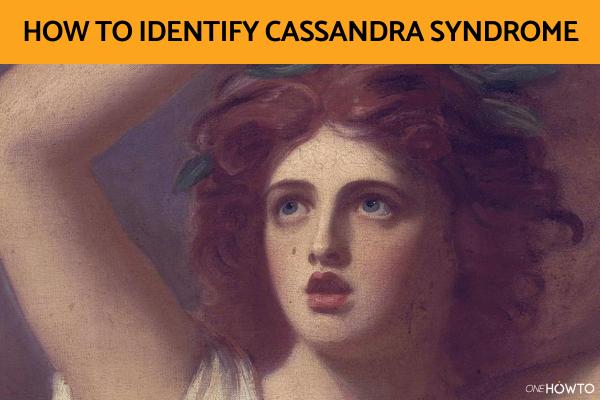How to Identify Cassandra Syndrome


The first thing to know about Cassandra syndrome is that it is not a clinical psychological diagnosis. It is a social concept or metaphor which can be applied to certain people who make predictions about the future. More specifically, it is a syndrome about someone who makes accurate predictions, but who is ignored by wider society. More than being ignored, people experiencing Cassandra syndrome may even be ridiculed. It derives its name from the figure Cassandra from Greek mythology who had the gift of prophecy, but was cursed. This curse was that no one would ever believed her predictions. Learn more as oneHOWTO explains how to identify Cassandra syndrome, as well as how to overcome it.
What is Cassandra syndrome?
While there is no objective or conclusive evidence that supports true clairvoyant predictive ability, but some of us are more astute than others. Whether due to a strong intuition or a result of exhaustive research, some of us are able to make predictions about the future with relative accuracy and consistency. Some of us are lauded for our predictive ability, but others are ignored or even castigated.
Psychology refers to this type of situation as Cassandra syndrome. It is a syndrome coined by the French philosopher Gaston Bachelard in 1949 and which has its origin in Greek mythology. It shares a story whereby Apollo fell in love with Cassandra, a priestess who had the gift of clairvoyance. Since she did not respond to Apollo, the god condemned her to ensure that no one would believe her prophecies, no matter how accurate.
Cassandra syndrome has a direct impact on the mental and emotional health of the person who suffers from it. They feel frustrated and misunderstood due to their heightened intuition and premonition, which is not heard by others.
The level of negative response to our predictions can vary according to many contexts. For example, some cultures may have seen certain predictions as being sacrilegious or in some way culturally offensive. This could have happened in the past, but it still happens in the present. The repercussions of this can vary, with some even facing serious consequences such as ostracization or even violence.
It is important to know what Cassandra syndrome is not a clinical diagnosis for a single person. It is a cultural phenomenon which is used as a metaphor for what happens to certain people in certain situations. Someone may experience Cassandra syndrome in the short term, but others may experience it regularly.
We also must distinguish between Casandra syndrome and related concepts. Cassandra syndrome occurs when you are correct about something, but it is the perception of others which is wrong. This is unlike the Dunning-Kruger effect whereby people overestimate their own ability or intellect. In this latter case, they often experience ridicule because their self-perception is distorted. With Cassandra syndrome, the distortion lies in the perception of others.

How to identify Cassandra syndrome
Like any other syndrome, Cassandra syndrome can manifest itself in a number of ways. Combined, they provide a set of traits or symptoms that produce some discomfort in the person experiencing it, even if it is not considered a clinical disorder in itself. These manifestations include:
- Fear: one of the main traits manifested by people with Cassandra syndrome is fear, the constant feeling of alarm that something negative will happen. This anticipatory fear can have two main causes. The first is the awareness of the negative aspects they perceive around them. The second is the fear of not being understood or the fear of lack of trust from others.
- Sadness: not feeling heard or understood by others can lead those who suffer from this syndrome to low mood and a certain level of sadness. This is generally caused by the feeling of incomprehension and frustration generated by their disregarded intuition.
- Decreased self-esteem: people with Cassandra syndrome often find their self-esteem diminishing. Many even begin to doubt their own judgment or intuition. The disbelief others evoke in their heightened intuition can have an impact on these individuals, causing them to lose confidence in themselves or their perception of reality.
- Social phobia: another trait experienced by people with Cassandra syndrome is a certain social phobia resulting from feeling previously judged for their ideas or premonitions. This phobia causes sufferers to tend toward isolation or to ignore their intuition for fear of renewed rejection. This phobia can also have a significant impact on establishing interpersonal relationships. This is not only due to the fear the syndrome produces, but also due to the lack of credibility emanating from premonitions or the feeling of not being 100% understood by the rest of society.
- Frustration: impotence and frustration are the fruits of the powerlessness that come from not feeling heard or understood and seeing predictions come true without anyone paying attention to them.
- Stress and anxiety: not feeling validated by others can lead to constant stress and anxiety. In more severe cases, this can lead to depression.
- Constant worry about the future: those suffering from Cassandra syndrome experience constant pressure and anxiety about what lies ahead. Their heightened intuition keeps them alert and concerned due to their high sensitivity to future events.
Learn more about managing stress and anxiety with our article on how to effectively unplug from work.

How to overcome Cassandra syndrome
Like any other psychological condition, Cassandra syndrome can be overcome with the right practical and emotional approach. This will help manage frustration, reduce fear and, above all, improve communication with others.
Overcoming Cassandra syndrome can sometimes be difficult due to the intensity of the feelings involved, as well as the desperation generated by not feeling understood. Obtaining the necessary tools and having a good support network can be key to a person's recovery. The focus of recovery should be on transforming thought and behavior patterns. To achieve this, we recommend the following strategies:
Improve communication
One of the key steps that will allow you to overcome Cassandra syndrome is to improve your communication with others. The problem is often not in what you say, but how you say it. One of the basic strategies is to try to express your concerns in a structured and clear way that uses supporting evidence. This way, your message will better reach your target audience.
Work on your own confidence
To overcome Cassandra syndrome, you must strengthen your self-confidence. Since feelings of low self-esteem and mood can be very present if others don't believe you, you must work on your self-confidence so you don't doubt yourself like others do. Our advice is to practice emotional self-care. Take confidence in your analytical and perceptive abilities without letting others diminish them.
Discover how to be confident in a healthy way with our guide to saying no without offending someone.
Seek external support
Having a support network can be a key step in overcoming Cassandra syndrome. To do this, surround yourself with people who value your opinions, feelings and thoughts. This is the best way to receive emotional support. Even if it seems like no one is heeding your warnings, there are surely many more people who understand and respect your heightened intuition.
Accept that not everything can be controlled
Another key to overcoming this condition is understanding that you can't control the reactions of others, even if you have their best interests at heart. You certainly can't control whether others will listen to you, understand you or heed your advice. Learn to let go of the need for external validation and focus solely on what you can change yourself.
Working on emotional intelligence
One of the symptoms through which this symptom manifests is frustration, that feeling of helplessness in the face of others' disbelief and incomprehension. Working on emotional intelligence through therapy, meditation or writing can be key to channeling your emotions and reducing the negative feelings caused by your high sensitivity and intuition.
Rely on professionals
Last but not least, if Cassandra syndrome is seriously affecting your emotional well-being, don't hesitate to seek professional support. Psychologists and therapists can provide you with the appropriate tools for each case, guiding you through how to properly manage the situation and strengthen your self-esteem.
Now that you know what Cassandra syndrome is, you might also be interested in our articles on the meanings of Greek mythology tattoos.
This article is merely informative, oneHOWTO does not have the authority to prescribe any medical treatments or create a diagnosis. We invite you to visit your doctor if you have any type of condition or pain.
If you want to read similar articles to How to Identify Cassandra Syndrome, we recommend you visit our Mental health category.






